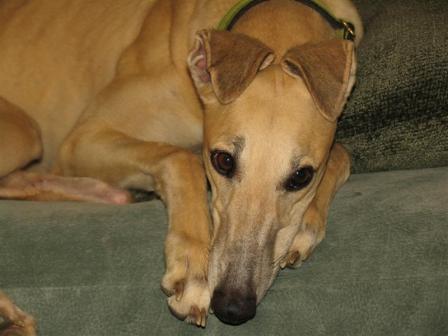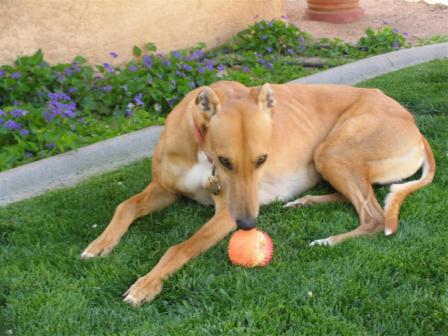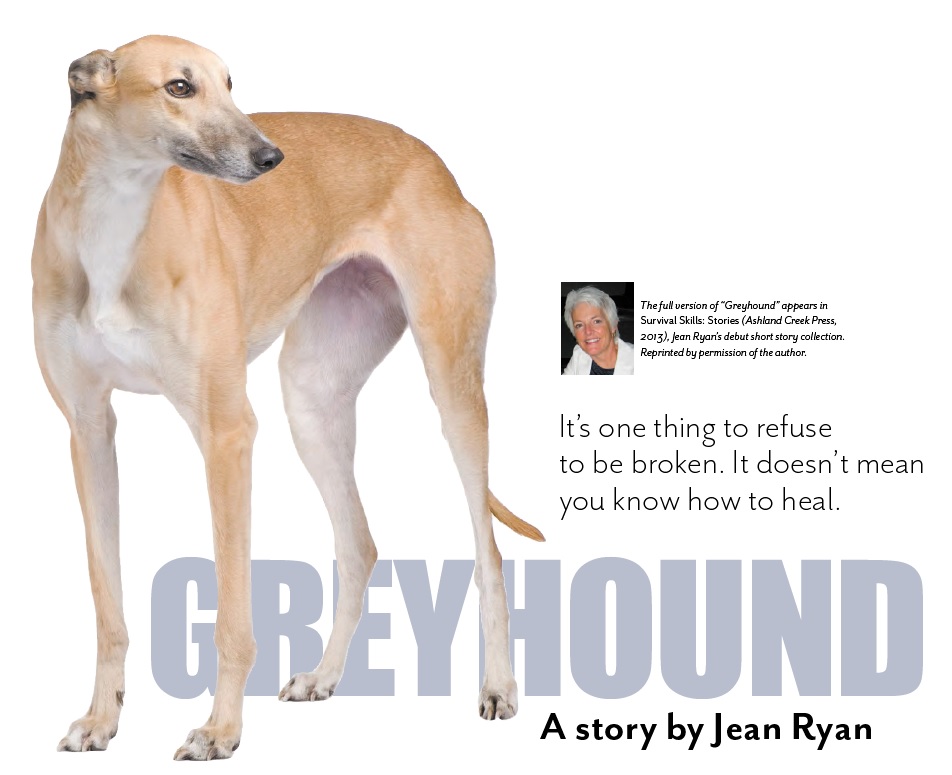THIS PLACE IS NOT like the pound—greyhounds don’t bark, nor do they make any frenetic appeals for freedom, nor do their sleek bodies betray any sign of disease. Professional athletes, these dogs have been fed and watered with precision. Now, fi nally pardoned, they rest comfortably in their cages and eye me warily: What do I want from them?
Pick one, I keep telling myself. But how? Th ey look away, refuse to help me.
“Do you know anything about them?” I ask the attendant, a plump blonde in a tight green uniform. “Th eir personalities, I mean.”
“Sure.” She pushes herself off the wall and points to the dog in front of us. “Th at’s Digger Dan. He’s 5. Raced in eight states. He’s stubborn but real smart. And that’s Buck Shot. He’s 4, kind of skittery.”
We move down the row. “Shoot the Moon’s a good dog.” She shrugs. “Th ey’re all good dogs.” We stop at another cage and peer at a brindled greyhound the colors of a fawn. “Th is one’s new.” Th e blonde puts her hands on her hips and chuckles. “You know what she did? She stopped running. Th e gate opened one day, and she wouldn’t budge.”
She is lying still as a sphinx, paws neatly crossed, tail tucked away. Her deep brown eyes appraise us; there’s no telling what she concludes. I stare back, and her gaze slides off .
“How old is she?” I ask.
“Three. She ran for just over a year. Clara’s Gift, they called her. She was good, a favorite. Funny the way she quit.”
The dog is waiting for us to leave—I can see the tension in the sculpted muscles of her back.
“Can I pet her?” I ask.
“They’re not used to affection,” the blonde says, opening the cage. “They don’t understand it.”
I come closer, and the dog rises to a sitting position. Her eyes are large and apprehensive. Carefully I extend my hand; she sniff s it and shrinks. When I touch her, she fl inches. “Good girl,” I soothe, and though she allows me to pet her shoulder, it’s not much fun for either of us.
Great. I could have gone to the pound and come back 30 minutes later with a fat, tail-wagging puppy, but here I am at the greyhound shelter, 112 miles from home, offering up my heart to a dog who just wishes I’d go away.
I arch an eyebrow at the attendant, and she smiles sympathetically. “Th ey’re all like that in the beginning,” she assures me, “and then, after a few weeks, they can’t get enough of it.” Dubious, I turn back to the dog, who is looking at my arm as if it were a rolled-up newspaper.
“Just move slowly,” she says. “They don’t like sudden movements. And they don’t like having their crate space invaded.”
“Crate space?”
She nods. “Greyhounds spend most of their time in crates—they sleep in them; they feel safe in them. Th ese cages are like their crates.”
I pull my arm out, and the dog cautiously lowers herself back down. There is no waste on this animal; she is muscle and tendon, angle and bone; even her veins have no place to hide. Her forelegs are so thin and straight I have to turn away. There must be 30 dogs here, all remote and silent as statuary.
“I thought they’d be old,” I say.
“Oh, no. Two years of racing is about the norm. Some of them run longer— you can tell by their paws.” She points to a large black-and-white hound. “Like that one. See how his front toes are twisted? Th e oval track does that. Most of these dogs are retired because of injury, or because they stop winning.”
“Or running,” I add, bringing my gaze back to Clara’s Gift, realizing I have made my choice. And she knows, too, even before I tell the attendant. Alarmed, she gets to her feet, prepares to submit. It breaks my heart how good she is about being taken away, how dignified her walk to my truck. What price has she paid to behave like that?
I let her ride in the cab. She perches on the bench seat, taking up almost no space, and looks worriedly out the window. I keep murmuring assurances, but my voice doesn’t calm her. As soon as we merge onto the highway and the Oregon mountains begin rushing by, she crawls off the seat and into the back of the cab.

THE
DOG IS a present for Holly. She thinks I’m running errands for the
store, picking up organic lettuces and local honey. That’s where we met,
my health food store. She came in one day and showed me the patches of
eczema on her arms and asked me what she could do about them. I sold her
some B-complex vitamins and a bar of oatmeal soap. Not long after that
she moved in with me, and six years later we’re still together, and
still battling that eczema.
Not every day, of course—it comes and goes like magic. For weeks, even
months, her limbs are as smooth and pale as the creamy hollows of a
seashell. Most of the bouts are mild—mainly on her arms and the back of
her hands—but there are times when the rash terrifies us both, when it
moves up her neck and down her chest, turning the skin into a silvery
crust, till she hides herself even from me. Those are the times she
can’t sleep, and I find her on the back steps rocking herself in the
moonlight.
This has been a tough year for Holly— four episodes already—and two
weeks ago, at the start of another flare-up, she quit her job at the
Talking Turtle Day Care Center. The parents were making comments, she
told me. “They get edgy at the sight of a rash, especially on an adult.”
“What about the children?” I asked.
“What do they say?” “Oh, they don’t mind. They just want to know if it hurts.”
I have persuaded her to take at least six months off, hoping some
private time will hush her demons. Still, it’s a shame about the day
care center: Nobody’s better with children than Holly. She can still
lose herself gazing at a puddle of tadpoles. People can’t believe she is
39 years old.
A dog, I thought, would be a good idea, would satisfy Holly’s
nurturing needs. So when I saw the ad for adopting a retired greyhound, I
couldn’t ignore the serendipity.
Now, glancing at the pile of literature they gave me, I’m having second thoughts.
Greyhounds come with a list of warnings: Did I know they shouldn’t be
left alone? Is my neighborhood quiet? Any toddlers in the house? And is
there a fenced-in field nearby? Once these dogs start running, God knows
where they’ll end up.
All I can see of Clara’s Gift are her front paws; she hasn’t moved in
over an hour. I don’t expect her to jump around joyfully, but why
doesn’t she whimper? For all she knows, we could be heading for another
racetrack.
I think of her sticklike limbs; they remind me of invalids, of nursing
homes and wheelchairs. Suddenly I don’t think I can do this. An exit
sign appears, and I move into the right lane. Would it be so
unforgivable, bringing back this damaged dog?
But I don’t. I take her home to Holly, as I do the fallen fledglings I
find, and all the other hapless creatures I don’t know how to fix.
“SHE
NEEDS A special diet. And we have to walk her twice a day.” I’m citing
the drawbacks right away, letting Holly know what we’re up against. “And
she isn’t housebroken either—none of them are.”
But Holly is scarcely listening. Sitting on her heels, facing the dog, she is already smitten.
“She’s so delicate,” Holly says. “Like a deer, or like one of those tiny primeval horses.”
“We’ll have to run her in the soccer field, a couple times a week,” I add. “Greyhounds need to run.”
“What did you say they called her?”
“Clara’s Gift.”
“What kind of a name is that?” Holly shakes her head. “No. We’ll call
her”—she pauses, smiles—”we’ll call her Fawn.” At the utterance of this
word, soft and perfect, the dog lifts her small folded ears.
SHORTLY
AFTER arriving, Fawn wedges herself behind the sofa. “The room is too
big,” I explain to Holly. We find a cardboard carton in the garage, and
Holly covers the bottom with an afghan. We place the box next to the
sofa, and, quick as a card trick, Fawn is inside.
For the next few days Fawn spends most of her time in that makeshift
crate, calmly watching us drink our coffee, read the mail, open and
close the drapes. At night, though, I sometimes see her dark silhouette
in the doorway. “Come here, Fawn,” I coax, “come here, girl.” But she
declines the invitation, and after a while I hear her nails clicking
down the hall as she makes her way back to her box. Whatever she needs,
it’s not our company.
As far as upkeep, she’s no trouble at all. All I did was lay down some
newspaper in a corner, and each morning I moved the papers a little
closer to the back porch, and by the third day she was waiting at the
door. There is something uncanny about this dog, some kind of age-old
wisdom behind those luminous eyes. I get the feeling she is smarter than
me and obeys out of politeness. Fawn comports herself so flawlessly I
am embarrassed to put her on a leash. We’ve seen plenty of squirrels,
and even a few jackrabbits, and Fawn ignores them all. We’ve tried
everything, from throwing sticks and Frisbees to jogging ahead of her,
and the thing is, she just won’t run.
I
AM SITTING on the sofa studying vitamin catalogs. Holly is lying on the
carpet next to Fawn; over and over, her hand moves down the smooth
slope of the dog’s neck. Fawn no longer needs the box, and while she
doesn’t exactly ask for affection, she doesn’t object to it either.
I push aside the catalogs and consider the raw patches of skin on
Holly’s arms. I wonder why the rash is so persistent this time and how
bad it will get. Holly claims she has no secrets, no private well of
grief. I want to ask all the old questions, one by one, to see if
there’s something we’ve missed.
“Such soft fur,” Holly says, her hand moving slowly, reverently down
the dog’s back. “They used to have wiry coats, like Airedales, but
that’s been bred out of them.” Holly has been reading everything she can
find on the subject of Greyhounds. “Their eyes weren’t this big
either—the breeders decided that big eyes would make them see the lure
better, so they elongated the head and made the occipital cavities
larger—the sense of smell was impaired in the process, but nobody cared
about that.”
She sighs. “They even changed the tails, made them longer so they
could work like rudders. The only trouble is, they keep breaking.
Puppies break their tails all the time. Their legs break, too,
especially the Italian greyhounds.”
Fawn’s gaze is fixed on the carpet. Greyhounds originated in Egypt,
Holly told me, and were called “gazehounds.” I observe Fawn’s glistening
brown eyes, their dark depths keeping the secrets of the pharaohs. How
can we make it up to her? How can we explain this powderblue carpet to
an animal that once roamed the banks of the Nile?
“I’ve never seen her wag her tail,” I say. “Have you?”
“No,” Holly says softly. She raises her hand and cups the small
blameless dome of Fawn’s head; the dog responds with a look of
forbearance in which I can glimpse the burgeoning of devotion.
“Fawn has never been alone,” Holly says. “She’s lived her whole life
with other dogs. Maybe we should let her spend some time with Maxine and
Crash.”
We share a nervous glance. Maxine is an old one-eyed Mastiff;
overweight, hobbled by arthritis. Crash is a 2-yearold black Lab who
hurls his body into whatever objects lie in his path. Neither one is
very bright, and they both bark too much.
“Okay,” I finally answer.
Fawn is studying the carpet again. I am sending my autistic child off to public school.
WILL
AND THEDA built their house out of aluminum cans and plastic jugs and
God knows what else. In their backyard is an old washing machine they
use as a smoker; in a gutted refrigerator next to it, they raise
crayfish.
As usual, Theda is up to her elbows in flour, and Will is out back working on the tractor.
“How’s our sweet baby girl?” Theda coos, reaching for Fawn with floured hands. Fawn ducks, backs up.
“She’s nervous,” I apologize. “New surroundings.”
“Well, of course she is,” Theda says. She settles her hands on her
wide hips and beams at Fawn. “She’s such a pretty little thing!”
Fawn cranes her neck, taking everything in. Back hunched, tail tight
between her legs, she is standing on the linoleum as if she were poised
on a flat of eggs.
We have already discussed Fawn’s problem with Theda, and she’s more
than happy to offer her dogs as a course of treatment. “Dogs need dogs,”
she said, “like people need people.”
“Are you ready, little one?” she says, grinning, and Fawn looks up at Holly for an answer.
We follow Theda’s thick blonde braid and swaying hips out of the
house. “Hey!” Will calls. We see him waving from atop the tractor. Crash
is running circles around the tractor and barking frantically.
“Crash!” Theda yells. The dog stops, turns his head. “Here, Crash!”
Now he is racing toward us, full tilt, flat out. Fawn freezes; Holly
crouches down next to her. Theda chuckles and, stepping forward, grabs
Crash’s collar just before he slams into us.
“Stay,” she orders, holding him back. “Lie down.”
Tongue lolling, sides heaving, Crash glances up at Theda, then back at
Fawn, and lowers his belly to the dirt. Fawn hasn’t moved; her ears are
flattened to her skull.
“I’ll let him go in a minute,” Theda says. “He’ll be fine.” Slowly
Holly gets to her feet. Theda ruffles the fur on Crash’s neck. “Beast,”
she declares, and gives us a wink.
When Theda finally lets go of Crash, he shoots over to Fawn and starts
sniffing. She just sinks to the ground and looks the other way. For the
next hour and a half, Fawn doesn’t move, not even when Maxine lumbers
over and flops down beside her. The four of us sit on the back steps
drinking homemade beer and watching Crash wear himself out: He whimpers
at Fawn, he jogs back and forth, he falls on his front legs and barks in
her face. But she gives him only an occasional baffled glance.
Theda shrugs. “We’ll try again tomorrow.”
No one says a word.

AN
HOUR LATER, Holly and I are sitting at the kitchen table drinking tea.
She is wearing her big white robe, and her arms emerge from the sleeves
like shy, ravaged animals. The eczema has surfaced on her neck and
throat now, which is why I doubled her dose of PABA and made the burdock
tea extra strong. More vitamin E? I am thinking. Brewer’s yeast?
It’s not like her to sit here idle—she should be reading, or using her
carving tools, or drawing up plans for the hall. My stomach tightens as
I look at the streaks on her neck, at her arms so thin and red. She is
no better, after all these weeks at home. The medicines aren’t working,
and the dog hasn’t helped at all.
As if summoned by my thoughts, Fawn appears in the doorway. There is no escaping those dark, bottomless eyes.
“What does she want?” I mutter, more to myself than to Holly. And I am
stunned when Holly answers right away, in a voice flat with truth: “She
wants to know what to do with herself. She wants to know how to be a
dog.” I am not surprised that night to find Holly gone from bed. I lie
there a moment, picturing her on the porch, her arms encircling her
knees, her face turned toward the moon shining behind blue clouds, and
then I put on my robe and head down the hall. At the entrance to the
kitchen, I stop. The back door is open, and in its frame I see Holly and
Fawn sitting on the steps. Holly’s arms are clasped around the dog.
“You have to run.” She is sobbing, her face pressed into Fawn’s neck.
“Please, please run.”
I have seen Holly cry, of course, but not like this.
A slow wedge of fear moves into my chest as I turn and edge back down
the hall. There is nothing left to draw on. We are bankrupt, stranded.
I LEAVE THE HOUSE early the next morning. I am anxious to get to work, to be in a place where the problems can be solved.
I drive down our dirt road, swerving past the potholes, and turn left
into town. Not many kids stop by anymore—we live too far out—but when we
had the house on Fulton Street, they were always around. They’d come to
view Holly’s miniatures, or to learn how to make salt crystals, or to
see the rescued wildlife convalescing in our backyard. Children can’t
get enough of Holly. They drop their guard, forget she’s a grown-up.
Again I imagine her on Fifth Avenue, working behind the plate-glass
windows, and I think of the dainty gardens and the mini deserts she
fashions now, and I see the way she’s pared down her life. From Bergdorf
Goodman to the Talking Turtle Day Care Center. There must be clues in
this, tips I can use to help her, and as I ponder them, I drive right
past my store.
I take my time driving home, reluctant to face Holly and the dog and
the mire we’re in. Again I picture Holly sobbing on the porch, and I’m
appalled by the things I don’t know about her. Just how close is she to
depletion?
And so I’m amazed to open the front door and find her humming in the
hallway. She has a tape measure in her hands and is writing down figures
on a piece of paper.
I smile at her. “The diorama?”
She walks up and kisses me. “I’m trying to decide if I should do just
one period or a progression of three—Triassic, Jurassic, and
Cretaceous.”
“The progression,” I answer.
“I knew you’d say that,” she says.
I AM SLICING UP spinach leaves for an omelet, and Holly is sitting at the table looking through her natural history books.
“Hadrosaurs had rookeries like birds,” she informs me. “Their nests were 10 feet in diameter.”
I smack the flat of my knife against a garlic clove and pull off the
papery skin. I am learning a lot about dinosaurs. But there is something
else I want to talk about right now. I brush the garlic slivers into
the hot skillet, and the fragrance fills the kitchen.
“You know,” I begin carefully, casually, “maybe it’s not important,
getting Fawn to run. If she doesn’t want to, maybe we shouldn’t try. I
mean, hasn’t she had enough of that?”
“It’s not the same thing,” Holly says without turning around.
“If we walk her every day,” I persist, “and watch her diet, she won’t get fat.”
Holly has no comment to this, but I see the resolution in her
shoulders, and I know I can’t change her mind and probably shouldn’t
try—she’s the expert when it comes to injury.
We are clearing the dinner dishes from the table when Fawn enters the
kitchen. She doesn’t pause on the threshold this time; she walks right
in and sits, and then startles all three of us. She lifts her chin and
makes a sound, something between a howl and a bark. Afterward, puzzled,
she looks behind her, not sure where the sound came from. A fork slides
off the plate in my hands and clatters on the floor. Holly turns to me,
her face radiant.
“She’s coming around.”
LIKE
MOST LONG -AWAITED phenomena, it happens without warning. We are
walking along the perimeter of the soccer field, as we do every
week—Holly near the fence, me on the inside, and Fawn in perfect step
between us. Holly is explaining why dinosaurs could not have been
cold-blooded when Fawn stops short. We look down at her, surprised.
She springs forward, checks herself, and with a last glance at Holly
she is bounding away, jackknifing over the field. Holly reaches for my
arm, and all we can do is watch as Fawn leaves us farther and farther
behind. In seconds she has reached the edge of the woods and is turning
back, closing in fast, racing without a reason, her body in a full
ecstatic stretch high above the ground.

